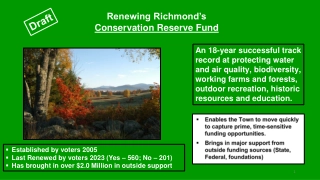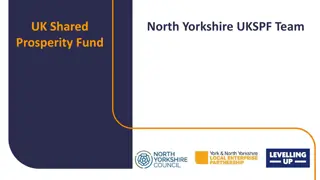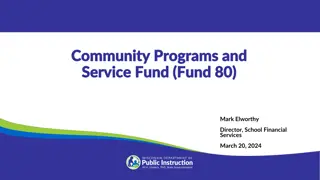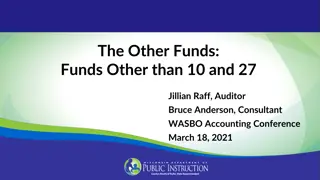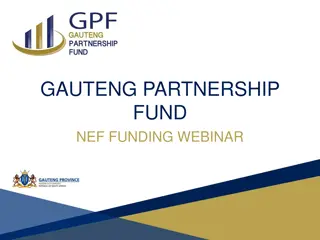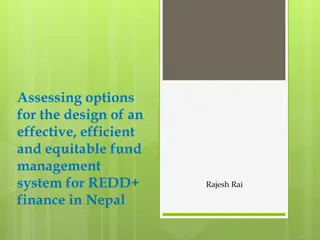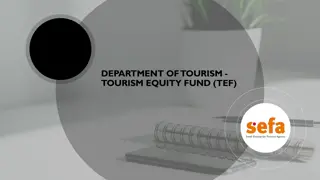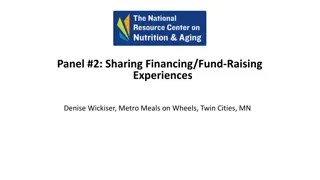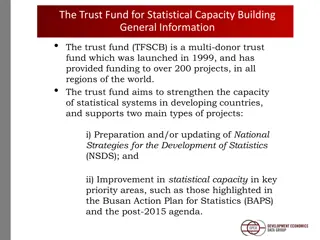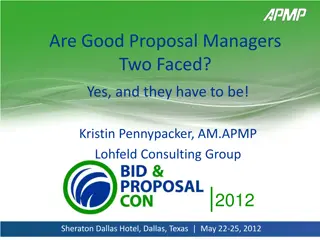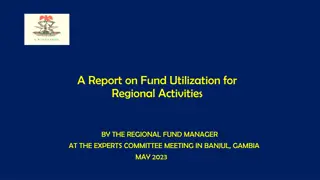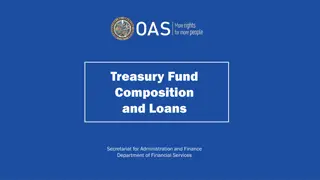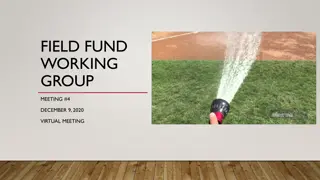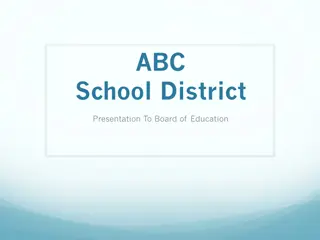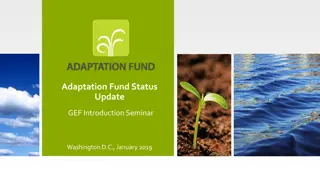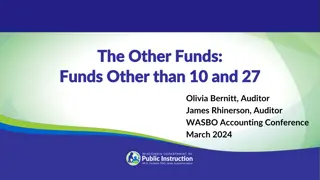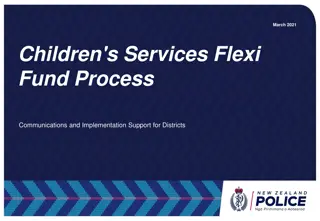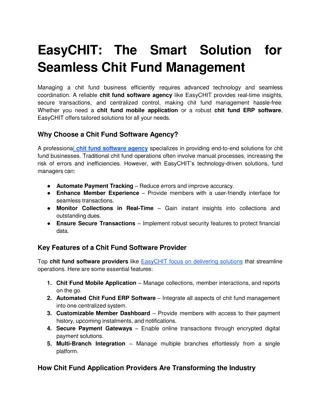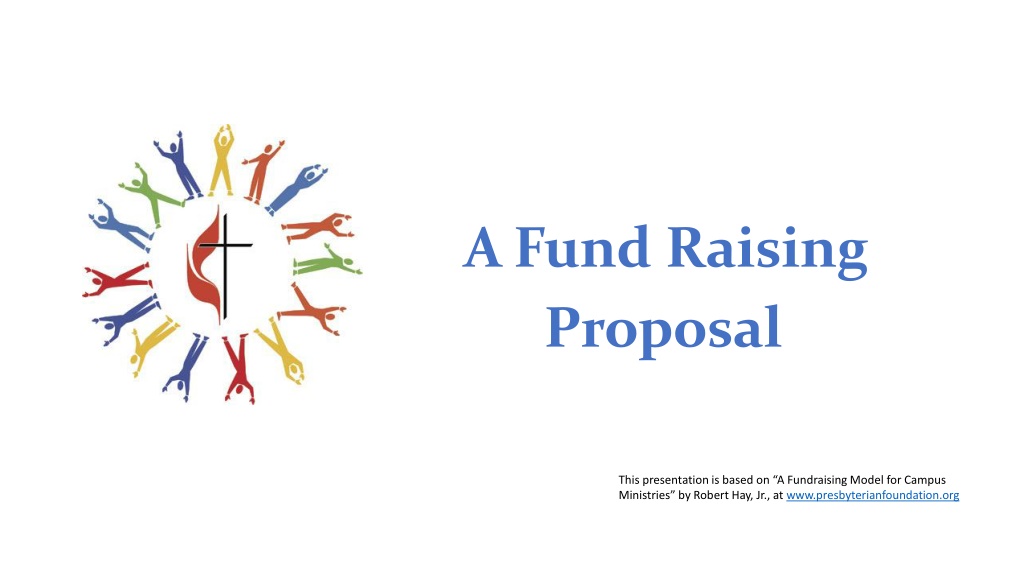
Campus Ministry Fundraising Strategies and Tips
Explore effective fundraising models for campus ministries, including types of funds, donor motivations, and tools for successful friend and fund raising. Discover how to create lasting relationships with donors and cultivate support for your ministry's vision.
Download Presentation

Please find below an Image/Link to download the presentation.
The content on the website is provided AS IS for your information and personal use only. It may not be sold, licensed, or shared on other websites without obtaining consent from the author. If you encounter any issues during the download, it is possible that the publisher has removed the file from their server.
You are allowed to download the files provided on this website for personal or commercial use, subject to the condition that they are used lawfully. All files are the property of their respective owners.
The content on the website is provided AS IS for your information and personal use only. It may not be sold, licensed, or shared on other websites without obtaining consent from the author.
E N D
Presentation Transcript
A Fund Raising Proposal This presentation is based on A Fundraising Model for Campus Ministries by Robert Hay, Jr., at www.presbyterianfoundation.org
The Proposal Outline Explanation of the Types of Funds Understanding Why People Give and Stop Giving Examine Your Vision and What is Needed to get there Establish a Dedicated Outreach and Development Team The Tools for Effective Friend and Fund Raising Identify Your Constituents and Develop a Support Plan A Recommended Annual Calendar for Fundraising Identification Cultivation Solicitation - Recognition
Three Types of Funds The Annual or Sustaining Fund A Major Gifts of Endowment Fund A Special Event Fundraiser
The Annual or Sustaining Fund Meets your annual campus ministry operations o Funds programs, administrative staff, internships, and building maintenance Focuses on alumni, local and district churches and church groups Key is to build relationships with donors Time spent in mailings, building database, and creating awareness Usually direct mail and visits Establishes membership or giving levels
Major Gifts or Endowment Funds Primarily a capital campaign that would focus on your plans for major building repair or improvements Larger gifts, often 10-20 times annual gift Decision made over time Built on strong relationship with donor and careful sharing of ministry vision Time spent on personal contacts
A Special Event Fundraiser Focuses on funding an event such as a mission trip or special ministry program such as book scholarships The special events could be a golf outing, a dinner, a concert, etc. The focus is on local church groups, friends of the ministry, faculty and staff, etc.
Why Do People Give? Belief in the mission High regard for the staff Belief that the organization is being fiscally responsible Because they are asked
Why Do People Stop Giving? Loss of a personal connection with the organization Supporting other causes The mission is no longer relevant to them Organization is not meeting its mission
Work on Your Vision Three Steps 1. First, spend some time on your visioning process what is good about the ministry that currently exists? What needs improving, expanding, creating? How can you talk about this in terms that are "urgent, relevant and important"? How does this vision meet critical student needs? 2. Second, do an accurate "needs assessment. Determine what you will need to make the vision happen. Be specific. Put dollar amounts on each part of your vision. You will want to set a campaign goal that is accurate not too little or too much. 3. Third, figure out a way to talk about "inviting people to support your vision" rather than asking them to meet your needs."
Establish an Outreach and Development Team Outreach: Formulate and implement a comprehensive program designed to interpret campus ministry and its needs to local churches, pastors, alumni, and others Prepare and send periodic newsletters and other communications to these groups. Ensure that the web site and social media supports this effort. Arrange for annual alumni events such as Homecoming or off-campus activities
Establish an Outreach and Development Team Development: Cultivate relationships with individuals, churches, church groups, community members and campus ministry alumni to raise funds for the campus ministry Plan and conduct annual financial campaigns, sponsor fundraising events, maintain a database of donors and ensure adequate income for the campus ministry. Note: All board members should be involved in outreach and development it is a primary board function
Tools for Outreach & Development Electronic Newsletters for Alumni, Friends and Church Groups Campus ministry activities, planned events and alumni news Establish a Campus Ministry Webpage Your students may not refer to your web site (beyond their freshman year) but those in your network examine the page to reinforce (or not) their commitment to support your campus ministry The site can be used for on-line giving (PayPal) Set up an Alumni Facebook page or other means for alumni to connect with each other allow access to Twitter or Instagram
Tools for Outreach & Development Set up a data base for contacts for addresses, email contact and record of giving four sections Alumni Friends of WWF Church Groups Board Members and Ex-board Member Use the data base email information for setting up a ListServ for bulk emails (protect the email addresses)
Friend Raising Constituents & Strategies Local Community Groups Friends of The Ministry Alumni Local Churches Annual Budget Church Groups Adult Sunday School Classes Home Churches District Churches District Church Groups UMM & UMW
Alumni Build a contact database (alumni and friends) Go through old records (let students help you) Create alumni Facebook group Use social media to get in touch with former alumni and get their contact information Be intentional at graduation Give them a gift at graduation Write them an individualized letter wishing them well and include a pledge card Start easy, ask for $10/month
Alumni Annual alumni event Around some other natural time that alums would come back to campus (homecoming, football game, graduation, etc.) Time of fellowship to catch up with old friends Invite former campus ministers Invite current and former board members Create an alumni award and give annually Make sure to use this event as an opportunity to hand out pledge cards/ envelopes
Alumni Regular contact via newsletters/ social media Keep alumni updated with social media status updates Send them newsletters regularly (electronic, preferred) Annually send them an update on how the year went with an ask for support Send personalized thank you letters and notes Send donor loyalty notes every year from students
Community Friends These normally come from faculty, staff, individual members of local churches, members of local civic groups List of ways they can help you Financially Bring meals Adopt a student Mentor a student Lead worship Drive students to church Provide housing for students during breaks
Community Friends Annual Thank You event Invite everyone who has provided any type of support to attend RSVPs Students plan and execute (maybe even cook) Entertainment/program Music, stories from the year, worship Consider creating a Community Friend annual award and presenting it Say THANK YOU!!!
Community Friends Ongoing communication Email and electronic newsletters Create a friends committee and have them organize themselves and create their own communication protocols Annual thank you letter and ask
Local Churches & Local Church Groups Ways to receive non-financial support Bring meals Adopt a student Mentor a student Lead worship Drive students to church Provide housing for students during breaks Encourage student participation at church (choir, volunteer advisor, etc.)
Local Churches & Local Church Groups Two Areas of Financial Focus Becoming part of the annual church budget. A Board Member addresses the Committee on Finance or the Service Committee and presents a request to be included in the Annual Church Budget. Receiving support from church groups examples in the UMC are UM Men, UM Women, and Adult Sunday School Classes. The have independent budgets and usually support after contact with the students or after the campus minister speaks at one of their meetings.
Local Churches & Local Church Groups Ongoing communication Regular relationship meetings with leadership of church (Pastor, committee chair, influential church member, etc.) Make sure to identify a point person for all communication to flow through Email and electronic newsletter Annual thank you letter and ask
Denominational Partners (Ecumenical) Invite them to attend your board meetings ex officio and give a state of the presbytery address to your board Follow all of their procedures for grant requests and turn in your requests early Seek their guidance on how best to make the request or submit reports For the VA Annual Conference the grants are performance based and standards of performance are included in the BHECM Handbook Chapter 6
UMC District Churches All VA Annual Conference Campus Ministries are considered a Ministry of the District The information discussed previously under Local Churches and Local Church Groups apply to district churches. As an example at William and Mary there were three local Methodist churches but we received financial support from over 15 district churches and church groups Refer to the UM publication for local churches: Guidelines Higher Education and Campus Ministry - Connect with Students in Schools, Colleges, and Campus Ministries This provides an explanation of how churches can support campus ministry in general and support district campus ministries
Student Home Churches Note from student Ask each student to write a letter to their home church thanking the church for all they have done in raising them State that they have found their church home away from home and that the campus ministry is helping to nurture them and support them while they are away from home Please consider supporting me while I am away at college through prayer, care packages, and consider supporting my campus ministry financially
How Do We Do This? Identification Recognition Cultivation Solicitation
Annual Calendar For Fundraising See Sample Annual Calendar Create your own Annual Calendar Campus Minister and Board hold each other accountable to it
Sample Annual Calendar (Academic Year) Identification Identification (Summer: Jun-July) Update and expand your data base Set fundraising goals for alumni, board, local churches, district churches and church groups and fundraising events Prepare your fundraising plan and gain board approval
Sample Annual Calendar (Academic Year) Cultivation Cultivation of Alumni/Friends (Start in Sep) Alumni Facebook Page (send campus ministry information monthly) Alumni Newsletters (send a Fall and Spring Semester edition) Hold Alumni Open Houses in conjunction campus events such as Homecoming in the fall and Graduation in the Spring Cultivation of Churches and Church Groups (Start in Sep) Send letters to churches asking to be included in annual budget (Sep) Send letters to church groups inviting them to part of the ministry Visit local churches, offer to speak, and participate in services
Sample Annual Calendar (Academic Year) Solicitation (Aug) Send out Annual Campaign letter to alumni and friends (Sep) Send out Annual Campaign letter to church groups (Sep) Send campaign letter to board members (Nov) Send out follow-up campaign letter to alumni/friends who have not donated (Dec) Send out end of year email reminder (Nov & Mar) Visit local and district church and church groups
Sample Annual Calendar (Academic Year) Recognition Recognition As received send out donor acknowledgement letter with IRS statement (Feb) send out handwritten appreciation notes from students (Apr) Send out newsletter acknowledging all donors (May) Invite major local donors to graduation or other events
Fundraising Cycle Identification Recognition Cultivation Solicitation

